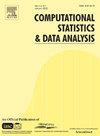Kernel density estimation with a Markov chain Monte Carlo sample
IF 1.6
3区 数学
Q3 COMPUTER SCIENCE, INTERDISCIPLINARY APPLICATIONS
引用次数: 0
Abstract
Bayesian inference relies on the posterior distribution, which is often estimated with a Markov chain Monte Carlo sampler. The sampler produces a dependent stream of variates from the limiting distribution of the Markov chain, the posterior distribution. When one wishes to display the estimated posterior density, a natural choice is the histogram. However, abundant literature has shown that the kernel density estimator is more accurate than the histogram in terms of mean integrated squared error for an i.i.d. sample. With this as motivation, a kernel density estimation method is proposed that is appropriate for the dependence in the Markov chain Monte Carlo output. To account for the dependence, the cross-validation criterion is modified to select the bandwidth in standard kernel density estimation approaches. A data-driven adjustment to the biased cross-validation method is suggested with introducing the integrated autocorrelation time of the kernel. The convergence of the modified bandwidth to the optimal bandwidth is shown by adapting theorems from the time series literature. Simulation studies show that the proposed method finds the bandwidth close to the optimal value, while standard methods lead to smaller bandwidths under Markov chain samples and hence to undersmoothed density estimates. A study with real data shows that the proposed method has a considerably smaller integrated mean squared error than standard methods. The R package KDEmcmc to implement the suggested algorithm is available on the Comprehensive R Archive Network.
核密度估计与马尔可夫链蒙特卡罗样本
贝叶斯推理依赖于后验分布,而后验分布通常是用马尔可夫链蒙特卡罗采样器估计的。采样器从马尔可夫链的极限分布,即后验分布中产生一个相关的变量流。当人们希望显示估计的后验密度时,一个自然的选择是直方图。然而,大量的文献表明,核密度估计器比直方图更准确的平均积分平方误差对于i.i.d.样本。以此为动机,提出了一种适合于马尔可夫链蒙特卡罗输出依赖的核密度估计方法。为了考虑相关性,交叉验证准则被修改为在标准核密度估计方法中选择带宽。通过引入核的积分自相关时间,提出了一种数据驱动的对有偏差交叉验证方法的调整。修正后的带宽收敛于最优带宽是由时间序列文献中的定理来证明的。仿真研究表明,该方法能找到接近最优值的带宽,而标准方法在马尔可夫链样本下的带宽较小,导致密度估计不够平滑。实际数据的研究表明,该方法的积分均方误差比标准方法小得多。实现建议算法的R包KDEmcmc可以在综合R存档网络上获得。
本文章由计算机程序翻译,如有差异,请以英文原文为准。
求助全文
约1分钟内获得全文
求助全文
来源期刊

Computational Statistics & Data Analysis
数学-计算机:跨学科应用
CiteScore
3.70
自引率
5.60%
发文量
167
审稿时长
60 days
期刊介绍:
Computational Statistics and Data Analysis (CSDA), an Official Publication of the network Computational and Methodological Statistics (CMStatistics) and of the International Association for Statistical Computing (IASC), is an international journal dedicated to the dissemination of methodological research and applications in the areas of computational statistics and data analysis. The journal consists of four refereed sections which are divided into the following subject areas:
I) Computational Statistics - Manuscripts dealing with: 1) the explicit impact of computers on statistical methodology (e.g., Bayesian computing, bioinformatics,computer graphics, computer intensive inferential methods, data exploration, data mining, expert systems, heuristics, knowledge based systems, machine learning, neural networks, numerical and optimization methods, parallel computing, statistical databases, statistical systems), and 2) the development, evaluation and validation of statistical software and algorithms. Software and algorithms can be submitted with manuscripts and will be stored together with the online article.
II) Statistical Methodology for Data Analysis - Manuscripts dealing with novel and original data analytical strategies and methodologies applied in biostatistics (design and analytic methods for clinical trials, epidemiological studies, statistical genetics, or genetic/environmental interactions), chemometrics, classification, data exploration, density estimation, design of experiments, environmetrics, education, image analysis, marketing, model free data exploration, pattern recognition, psychometrics, statistical physics, image processing, robust procedures.
[...]
III) Special Applications - [...]
IV) Annals of Statistical Data Science [...]
 求助内容:
求助内容: 应助结果提醒方式:
应助结果提醒方式:


